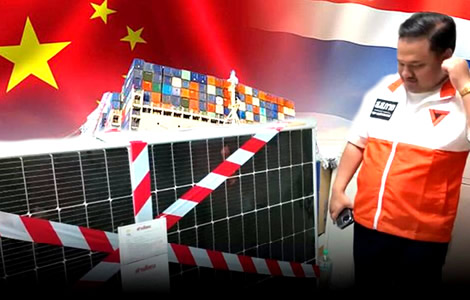US negotiators expose Thailand’s double talk as trade talks sour; deal likely worse than Vietnam’s. Meanwhile, a solar panel scandal reveals fake Thai certifications, fueling fears of Chinese imports undermining Thai industry and credibility.
Deputy Finance Minister Julapun Amornvivat on Sunday all but shut the door on the idea of Thailand offering 0% tariff access to US imports—an unmistakable sign that trade talks with Washington have again soured. This sharp contrast comes just a day after Finance Minister Pichai Chunhavajira described the July 17 meeting with US officials as “productive.” Behind the scenes, however, key figures like former Prime Minister Thaksin Shinawatra have already conceded the likely outcome: Thailand’s final tariff deal with the US could be significantly worse than the one struck with Vietnam. That would be a major blow to Thailand’s export competitiveness—and a potential setback for its long-term trade strategy.

Meanwhile, a scandal in Bangkok is fueling fresh doubts about the credibility of Thai industry. Authorities raided a solar panel factory supposedly among the country’s elite eight certified producers. What they found was damning—Chinese-made panels rebranded with fake Thai compliance stickers. The case highlights growing fears that foreign products are being funnelled into the Thai economy under false pretences, undermining both trust and trade.
Thailand is facing growing pressure over trade talks with the United States, despite early optimism from top officials. Finance Minister Pichai Chunhavajira had delivered a positive message on Saturday following a meeting with the United States Trade Representative (USTR).
Thai officials resist granting 0% tariff rate to the US amid fears over impact on farmers and trade commitments
However, by Sunday, the tone shifted sharply. Deputy Finance Minister Julapun Amornvivat issued a firm warning: Thailand will not grant the US a 0% tariff access rate on key imports. This, he said, would expose Thai agriculture and small producers to unacceptable risks.
Julapun explained that such a move would not only affect domestic industries but also violate Thailand’s international trade commitments. According to him, the Most-Favoured Nation (MFN) principle under current free trade agreements prevents Thailand from offering preferential tariffs to only one country.
If the US received 0% access, then other trading partners—particularly in the EU and Asia—would likely demand the same. Therefore, granting the US special terms could trigger a domino effect of legal and economic consequences.
The government is especially concerned about the agricultural sector, which remains fragile. Thai farmers, many of whom operate at subsistence levels, cannot compete with cheap foreign imports.
Consequently, even a small tariff cut could lead to major losses in rural income. Julapun stressed that the Thai government has a duty to protect this group. Moreover, the broader private sector—especially small and medium enterprises—would also suffer from unfair market exposure.
Finance Minister confirms ongoing US trade talks amid economic challenges and mixed export data trends
At the same time, Finance Minister Pichai confirmed that negotiations are still underway. Officials are currently analysing data from the July 17 meeting in Washington. Talks are ongoing, and Thailand has submitted a counter-proposal. However, it remains unclear how far both sides are willing to compromise. For now, Julapun made it clear that Thailand will not sacrifice its domestic industries for a one-sided trade arrangement.
Thailand’s economic performance adds another layer of complexity. According to government data, exports grew by 14.9% during the first five months of 2025. However, the Manufacturing Production Index (MPI) dropped by 4.49% over the same period.
On the surface, export growth looks promising. But the decline in manufacturing reveals deeper weaknesses. This suggests that Thailand may be acting more as a transit hub than a true producer. As a result, the country risks becoming dependent on re-exporting goods, especially from China.
Indeed, fears over Chinese transshipment have been growing for months. These concerns gained further traction following a high-profile raid in Chonburi province. The Thai Industrial Standards Institute (TISI) launched an investigation into a solar panel factory in Si Racha District. The factory was one of only eight approved to supply panels for government projects. However, it was found that they were relabeling Chinese imports and passing them off as Thai-certified products.
Solar panel factory raid exposes widespread relabeling of Chinese imports as Thai certified goods
The case was brought to light by Bangkok MP Natcha Boonchaiinsawat, who filed a formal complaint. He revealed that some government procurement rules had been manipulated. In particular, the Ministry of Interior required that only Thai TIS-certified solar panels be used in district-level installations.
This allowed only eight companies to compete. As a result, prices soared, and competition collapsed. Natcha alleged that Chinese panels costing just ฿1,000 were resold to contractors for ฿6,000 to ฿7,000. This massive markup—often without improvements in quality—represented possible corruption and collusion.
When TISI officers raided the facility, they found panels with Chinese stickers removed and replaced with forged TIS labels. The fakes carried the code “MHJK,” unlike the factory’s usual “MH” code. Investigators suspect that the altered code was used internally to track the disguised imports.
The factory’s intent, according to authorities, was to pass these off as local products under government contract. All related evidence has been seized and is now part of a criminal inquiry.
MP calls for broad probe into TISI-certified solar projects amid corruption fears and inflated government costs
In response, Natcha has called for a broader investigation into all TIS-certified projects. He believes the issue is systemic, involving spec manipulation and potential kickbacks. He plans to petition the House Budget Monitoring Committee to investigate procurement across multiple ministries.
The goal, he said, is to break what appears to be a tightly controlled and corrupt supply chain. Moreover, he warned that such abuses damage Thailand’s trade credibility—especially in talks with the United States.
This scandal couldn’t come at a worse time. Allegations that Thailand is being used as a hub for rerouted Chinese goods are likely to sour ongoing US trade negotiations. American officials have long expressed concern about product origin fraud.
If these fears are confirmed, Thailand may face increased scrutiny or even retaliatory measures from Washington. Therefore, the government now faces pressure to clean up domestic supply chains while defending its trade interests abroad.
Government prepares ฿200 billion loan fund to support farmers and businesses amid rising trade tensions
In an effort to cushion the economic impact of rising global trade tensions, the government is preparing a ฿200-billion soft loan fund. Deputy Minister Julapun said this financial support would help both farmers and private businesses weather potential disruptions.
The loans will target companies and individuals directly affected by shifting tariffs or declining competitiveness. He emphasised that economic uncertainty remains high and that proactive support is essential.
“The private sector will need to adapt,” Julapun said. “But the government must help them stay afloat.” He encouraged businesses to explore new markets, diversify exports, and reduce dependency on any single trade partner. According to him, adaptation will be the key to survival. At the same time, he stressed the importance of verifying product origin and promoting locally sourced goods. “We must be sure our exports meet origin rules and are genuinely made in Thailand,” he added.
Furthermore, Julapun called for tighter checks on how tax privileges are used. Products assembled in Thailand with foreign parts must meet minimum local content standards.
Otherwise, they risk breaching international agreements and weakening the country’s position in future trade deals. According to Julapun, any privilege without accountability could backfire in global negotiations.
Julapun says large entertainment and tourism ventures not yet a priority amid calls for national consensus
While some in government have floated the idea of economic diversification through large entertainment or tourism ventures, Julapun said such projects are not yet a priority. He confirmed that proposals like a casino-entertainment complex have not been discussed in cabinet. “We need national consensus first,” he said. “It’s not urgent right now.”
Critics argue that such delays reflect deeper problems in Thailand’s political and economic system. Despite repeated warnings, major reforms have stalled. Chronic issues—such as corruption, bloated bureaucracy and an outdated education system—continue to weigh down progress.
Without bold action, Thailand may lose more ground to faster-growing neighbours.
Vietnam, in particular, is becoming a serious competitor. Thanks to smart negotiations, Vietnam now offers 0% tariffs on US imports and favourable terms for its own exports. Investors are flocking there, drawn by efficiency, clear regulations and better logistics.
World Bank forecasts Vietnam’s GDP to surpass Thailand by 2028 in shifting Southeast Asian economic landscape
The World Bank estimates that Vietnam’s GDP will surpass Thailand’s by 2028. For many observers, this marks a dramatic shift in Southeast Asia’s economic landscape.
Thailand, once a regional leader, now finds itself at a crossroads. It must choose between short-term protection and long-term competitiveness.
Thaksin lifts morale of followers as US deal is in the works with a final rate close to that of Vietnam
Senate Committee Chair tells government to send Trump’s men packing and accept the 36% tariff rate
Trump tariff crisis has exposed the colonisation of the Thai economy by Chinese zero-dollar factories
While it is right to defend vulnerable sectors like agriculture, it must also innovate, modernise and stay ahead of global trade changes. Failure to do so may result in economic stagnation and loss of strategic relevance.
As trade talks with the US continue, the stakes are high. Every delay, misstep or scandal carries consequences. With the future of Thai exports, investment and GDP growth on the line, the government cannot afford indecision. The global economy is changing fast. Thailand must decide whether it intends to keep up—or fall further behind.


















